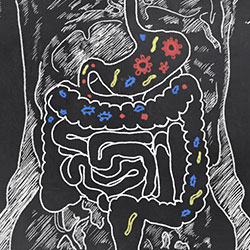- News
- 0 likes
- 626 views
- 0 comments
A guide to gastroenteritis and aromatherapy
Gastroenteritis is an inflammation of the stomach and intestines that manifests itself as profuse, watery stools, often accompanied by nausea and vomiting. The condition can be caused by a variety of pathogens, including germs (such as salmonella and coli bacteria), viruses (such as rotavirus, frequently responsible for winter epidemics), or parasites (such as amoebae, especially in developing countries). Stress can also contribute to the onset of gastroenteritis by disturbing the balance of intestinal flora.
Typical symptoms of gastroenteritis in developed countries include nausea, fever, vomiting, headache, abdominal cramps and loss of appetite. The severity of gastroenteritis can vary considerably, from mild to severe, depending on the underlying cause.
To treat mild forms of diarrhea, aromatherapy offers a natural and effective approach. By using essential oils with anti-infectious properties, it is possible to relieve symptoms and support healing. Specific essential oils can help treat infection, calm spasms and reduce associated symptoms, offering valuable support during episodes of gastroenteritis.
Anti-gastro" essential oils
 |
|
Directions for use :
Inhalation: Add a few drops of essential oil to a diffuser or inhale directly from the bottle to benefit from its antiviral and antibacterial properties.
Local application: Dilute essential oils in a vegetable oil (such as sweet almond or jojoba oil) and apply to the abdomen, massaging gently to relieve cramps and aches.
Bath: Add a few drops of essential oils mixed with a dispersant (such as milk or Epsom salt) to a warm bath for an overall soothing effect.
Precautions:
Always dilute essential oils before applying to the skin.
Do a skin test to check individual tolerance.
Consult a health professional before using essential oils, especially in cases of pregnancy, breast-feeding or pre-existing medical conditions.
The use of essential oils can complement medical treatments for gastroenteritis, but should not replace medical consultation in the event of severe symptoms.
Infectious diarrhea or gastroenteritis
Ceylon cinnamon(Cinnamomum zeylanicum) and Oregano compactum (Origanumcompactum) essential oils are particularly effective in treating digestive infections such as diarrhea or gastroenteritis.
Dosage: Add 1 drop of Ceylon cinnamon essential oil or Oregano compact essential oil to a spoonful of olive oil or honey. Melt in the mouth 3 to 4 times a day, before or after meals.
A more complete formula can be composed with the following five essential oils:
Nervous diarrhea
Nervous diarrhea is often triggered by stress or emotional shock, disrupting the balance of intestinal flora. To relieve this form of diarrhea, Marjoram(Origanum majorana) essential oil can offer effective relief thanks to its soothing and regulating properties.
Dosage
- Oral route: Pour 1 drop of Marjoram essential oil into a spoonful of olive oil or honey. Allow to melt in the mouth, 3 to 4 times a day, before or after meals.
- Local application: Apply a drop of Marjoram essential oil to the solar plexus every 3 hours for a soothing, regulating effect.
Associated dietary and hygiene advice
Stay well hydrated with mineral water or herbal teas (chamomile).
Eat rice and drink cooking water. Wash hands thoroughly with soap or use hydro-alcoholic solutions.
Avoid physical contact, sharing glasses, cutlery, napkins, etc
Probiotics (ferments sold in pharmacies) strengthen your defenses. They are recommended after an episode of diarrhea, but also as a preventive measure for sensitive individuals.
Precautions for use
- This advice is intended for adults and children over the age of 7.
- It is not intended for pregnant women.
- This advice must not be applied in the event of allergy to one of the components.
- This advice should not be applied in cases of asthma, epilepsy or serious respiratory pathologies.
- In the event of complications (persistent symptoms, fever, abnormal stools): consult your doctor.

Comments (0)